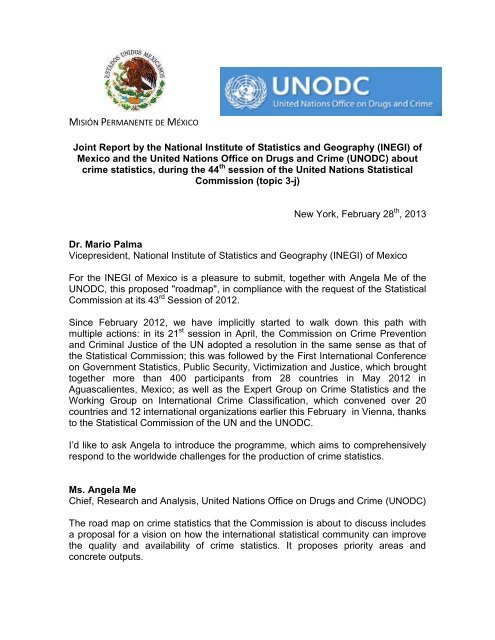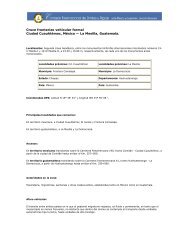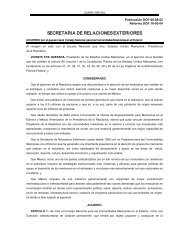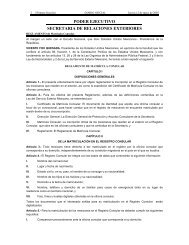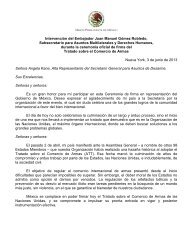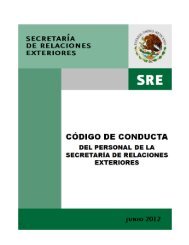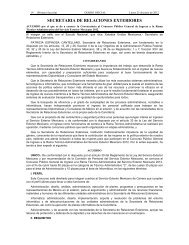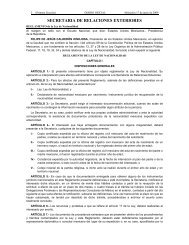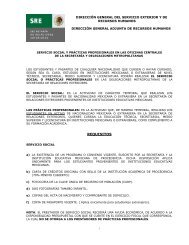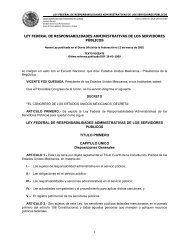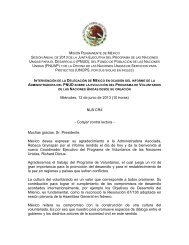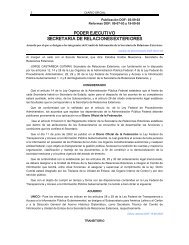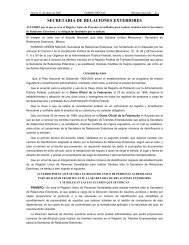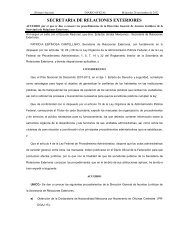Joint Report by the National Institute of Statistics and Geography ...
Joint Report by the National Institute of Statistics and Geography ...
Joint Report by the National Institute of Statistics and Geography ...
You also want an ePaper? Increase the reach of your titles
YUMPU automatically turns print PDFs into web optimized ePapers that Google loves.
MISIÓN PERMANENTE DE MÉXICO<strong>Joint</strong> <strong>Report</strong> <strong>by</strong> <strong>the</strong> <strong>National</strong> <strong>Institute</strong> <strong>of</strong> <strong>Statistics</strong> <strong>and</strong> <strong>Geography</strong> (INEGI) <strong>of</strong>Mexico <strong>and</strong> <strong>the</strong> United Nations Office on Drugs <strong>and</strong> Crime (UNODC) aboutcrime statistics, during <strong>the</strong> 44 th session <strong>of</strong> <strong>the</strong> United Nations StatisticalCommission (topic 3-j)New York, February 28 th , 2013Dr. Mario PalmaVicepresident, <strong>National</strong> <strong>Institute</strong> <strong>of</strong> <strong>Statistics</strong> <strong>and</strong> <strong>Geography</strong> (INEGI) <strong>of</strong> MexicoFor <strong>the</strong> INEGI <strong>of</strong> Mexico is a pleasure to submit, toge<strong>the</strong>r with Angela Me <strong>of</strong> <strong>the</strong>UNODC, this proposed "roadmap", in compliance with <strong>the</strong> request <strong>of</strong> <strong>the</strong> StatisticalCommission at its 43 rd Session <strong>of</strong> 2012.Since February 2012, we have implicitly started to walk down this path withmultiple actions: in its 21 st session in April, <strong>the</strong> Commission on Crime Prevention<strong>and</strong> Criminal Justice <strong>of</strong> <strong>the</strong> UN adopted a resolution in <strong>the</strong> same sense as that <strong>of</strong><strong>the</strong> Statistical Commission; this was followed <strong>by</strong> <strong>the</strong> First International Conferenceon Government <strong>Statistics</strong>, Public Security, Victimization <strong>and</strong> Justice, which broughttoge<strong>the</strong>r more than 400 participants from 28 countries in May 2012 inAguascalientes, Mexico; as well as <strong>the</strong> Expert Group on Crime <strong>Statistics</strong> <strong>and</strong> <strong>the</strong>Working Group on International Crime Classification, which convened over 20countries <strong>and</strong> 12 international organizations earlier this February in Vienna, thanksto <strong>the</strong> Statistical Commission <strong>of</strong> <strong>the</strong> UN <strong>and</strong> <strong>the</strong> UNODC.I’d like to ask Angela to introduce <strong>the</strong> programme, which aims to comprehensivelyrespond to <strong>the</strong> worldwide challenges for <strong>the</strong> production <strong>of</strong> crime statistics.Ms. Angela MeChief, Research <strong>and</strong> Analysis, United Nations Office on Drugs <strong>and</strong> Crime (UNODC)The road map on crime statistics that <strong>the</strong> Commission is about to discuss includesa proposal for a vision on how <strong>the</strong> international statistical community can improve<strong>the</strong> quality <strong>and</strong> availability <strong>of</strong> crime statistics. It proposes priority areas <strong>and</strong>concrete outputs.
The priority areas include:· <strong>the</strong> development <strong>of</strong> an international classification <strong>of</strong> crime for statisticalpurposes,· <strong>the</strong> promotion <strong>of</strong> new data collection tools such as victimization surveysamong households <strong>and</strong> business, <strong>the</strong> use <strong>of</strong> GIS <strong>and</strong> remote sensing,· <strong>the</strong> development <strong>of</strong> measurement frameworks for those forms <strong>of</strong> crimewhich are <strong>of</strong> high political relevance but are almost invisible due to <strong>the</strong> scarcity<strong>of</strong> data, such as corruption, organized crime, money laundering, cybercrime,trafficking in persons, smuggling <strong>of</strong> migrants· <strong>the</strong> improvement <strong>of</strong> <strong>the</strong> quality <strong>of</strong> information <strong>and</strong> knowledge disseminated<strong>by</strong> UNODC at international levelIn relation to <strong>the</strong> classification, <strong>the</strong> last Statistical Commission asked UNODC <strong>and</strong>INEGI to assess its feasibility <strong>and</strong> we are happy to report that during one year <strong>of</strong>consultation <strong>and</strong> testing we came to <strong>the</strong> conclusion that <strong>the</strong> classification isfeasible <strong>and</strong> highly needed. The roadmap includes a proposal for a series <strong>of</strong>activities which contribute to <strong>the</strong> finalization <strong>of</strong> <strong>the</strong> classification <strong>and</strong> its submissionto <strong>the</strong> Statistical Commission in 2015.The types <strong>of</strong> activities that <strong>the</strong> roadmap proposes include three areas:· support to countries to improve <strong>the</strong> capacity to collect, disseminate <strong>and</strong>analyze crime data particularly on those forms <strong>of</strong> crime which are most difficultto measure.· development <strong>of</strong> international st<strong>and</strong>ards (for example <strong>the</strong> development <strong>of</strong> amanual on victimization surveys in businesses, <strong>the</strong> provision <strong>of</strong> statistical toolsto measure corruption, <strong>and</strong> <strong>the</strong> finalization <strong>of</strong> indicators framework formeasuring organized crime)· improvement <strong>of</strong> international data series <strong>and</strong> analytical products which canbetter describe <strong>the</strong> crime problem across countries <strong>and</strong> regions in view also <strong>of</strong>providing <strong>the</strong> measurables needed in <strong>the</strong> post 2015 development agenda ifareas such as security <strong>and</strong> access to justice are includedThe Group <strong>of</strong> experts that recently met in Vienna discussed <strong>the</strong> vision presented in<strong>the</strong> roadmap <strong>and</strong> it provided suggestions on how to implement <strong>the</strong> differentproposals. The report <strong>of</strong> <strong>the</strong> meeting is available to <strong>the</strong> Commission as roomdocument. The group agreed that <strong>the</strong> roadmap can be implemented only if <strong>the</strong>re iscollaboration between <strong>the</strong> international statistical community <strong>and</strong> <strong>the</strong> internationalcommunity working on crime <strong>and</strong> criminal justice through a joint work between <strong>the</strong>two UN Commissions which at national level translates into coordination betweenNSOs <strong>and</strong> criminal justice institutions. While <strong>the</strong>re is not a national coordinationformula that can be applied to all countries, <strong>the</strong> roadmap invites NSOs to be moreproactive in promoting coordination <strong>of</strong> all criminal justice institutions <strong>and</strong> inimplementing victimization surveys.The roadmap is quite ambitious <strong>and</strong> <strong>the</strong> group <strong>of</strong> experts supported <strong>the</strong> idea <strong>of</strong>developing regional <strong>and</strong> international partnerships which can contribute to <strong>the</strong>different areas <strong>of</strong> <strong>the</strong> roadmap, particularly in Africa <strong>and</strong> Asia where data are most
scarce. In this context <strong>the</strong> good example <strong>of</strong> <strong>the</strong> UNODC-INEGI Center <strong>of</strong>Excellence for Statistical Information on Governance, Victimization, Public Security<strong>and</strong> Justice was recognized encouraging o<strong>the</strong>r regions to develop similarpartnerships.To conclude, we would encourage <strong>the</strong> Commission:· to review <strong>and</strong> endorse <strong>the</strong> vision <strong>and</strong> activities presented in <strong>the</strong> roadmap<strong>and</strong> discuss <strong>the</strong> course <strong>of</strong> action for its implementation· to call for a joint Expert Group between <strong>the</strong> SC <strong>and</strong> <strong>the</strong> Commission onCrime Prevention <strong>and</strong> Criminal Justice to monitor <strong>the</strong> implementation <strong>of</strong> <strong>the</strong>roadmap <strong>and</strong> advise on <strong>the</strong> relevance <strong>and</strong> quality <strong>of</strong> <strong>the</strong> different outputs.· To promote initiatives which foster <strong>the</strong> coordination among nationalinstitutions involved in crime <strong>and</strong> criminal justice statistics <strong>and</strong> invite NSO tobecome proactive to promote coordination <strong>and</strong> consider <strong>the</strong> implementation <strong>of</strong>population <strong>and</strong> business victimization surveys· To support <strong>the</strong> organization <strong>of</strong> <strong>the</strong> Second International Conference onCrime <strong>Statistics</strong> in 2014Thank you very much.


